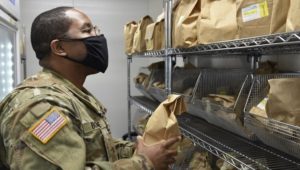
Army Sgt. Tyson Boothe fills a patient’s prescription at Walter Reed National Military Medical Center’s new prescription drive-thru pick-up, located in in the parking lot of building 85T near Gate 1 (North gate). Photo by Sean Patten, WRNMMC
BETHESDA, MD — The coronavirus shook up prescription delivery in March, and military pharmacies might never be the same again.
In the spring, pharmacies quickly revamped protocols to keep delivering vital medications to patients while minimizing the potential for spread of SARS-CoV-2, the virus that causes COVID-19. Some of the more spacious military facilities adapted their physical layout to support social distancing recommendations, while others rolled out curbside pick-up and “car hop” services, often within a matter of days.
Other pharmacies expanded hours for existing drive-thru services, and many implemented new drive-thru options within weeks. The Regional Health Command Atlantic, based at Fort Belvoir, VA, established 11 drive-thru pharmacies in March and April alone.
Eight months in, some of the temporary changes are looking fairly permanent. The drive-thru lanes in particular have experienced great success and high rates of customer satisfaction in many locations.
They’ve been so popular, in fact, that facilities have continued to add them. In September, Walter Reed National Military Medical Center (WRNMMC) celebrated the grand opening of a new prescription drive-thru pick-up. It is a more permanent upgrade from the curbside pick-up service WRNMMC has offered since March.
“This new prescription drive-thru pick-up will be a better environment for staff and a more convenient and satisfying experience for patients,” said Emily Zywicke, PharmD, chief of the WRNMMC Pharmacy Department. “The new prescription drive-thru pick-up requires the patient to activate their new or refill medication 24 hours in advance, by phone or via TRICARE Online. The patient may drive-thru the new pharmacy pick-up in the parking lot of building 85T and have their medications within minutes.”
The drive-thru has achieved great traction at the Desmond T. Doss Health Clinic at Schofield Barracks, HI, too. On Oct. 29, the clinic filled its 100,000th prescription after 216 days of operating the drive-thru.
The lucky recipients of the milestone prescription got quite a bonus with their medications. The team presented them with a candy lei, a 100,000th prescription pad, balloons, commander’s coin and a $25 Army and Air Force Exchange Service gift card. The surprised driver, Anthony Lavery, had never used the drive-thru before but noted he liked the openness of the set-up and the two lanes for service.
It hadn’t always been so smooth. The initial set-up required some creativity and continual refinement but launched in less than two weeks. “Right away, we knew that our pharmacy waiting room was not suited for 6 feet of separation, so after several discussions between my pharmacy team and the deputies, we decided we had to find a way to operate a drive-thru pharmacy where patients would remain in their vehicles,” said Jason Moon, the DDHC pharmacy chief.
The pharmacy team identified the acute care clinic parking lot as the best location. The 25th Infantry Division supported the pharmacy with runners who delivered medications to the cars. The walkie-talkies and cellphones used for communication at first were replaced by four new phone lines. Two tents were added to protect walk-up patients and runners in bad weather.
The combination of creativity and commitment has been well-received. Since opening on March 28, the drive-thru has averaged 14,409 prescriptions per month and has served more than 300 cars on some days.
“I just wanted to compliment the pharmacy based on my recent experience in the drive-thru services. I was extremely impressed with the timeliness, efficiency and attention to detail that was provided,” said one happy customer. “In light of the recent pandemic, I was worried about getting refills and/or filling any new prescriptions for my children and myself. I’m happy to report that I didn’t even have to get out of my car to get my prescription and I didn’t feel at all as if care or safety was compromised.”
Challenges Continue
Not all military pharmacies have had such a smooth experience. At Madigan Army Medical Center at Joint Base Lewis-McChord, WA, wait times ran so long this summer that the medical center’s website encouraged individuals who turned off their cars while in line to use their phones to listen to music, because a number of customers had drained their car batteries listening to the radio.
High demand and a number of staff members quarantined as a result of COVID-19 exposure combined to create a difficult situation for the pharmacy and its patients with the drive-thru being the only way to pick up prescriptions.
“Our patients’ safety is our paramount concern, as well as providing you the highest quality of care and the excellent level of service that is synonymous with the Madigan name,” said Madigan Commander Col. Christopher Warner in a September Facebook video streamed to more than 20,000 Madigan followers. “While our initial focus is remedying the current pharmacy situation, I have heard your feedback and concerns that there is still room for improvement in our long-term pharmacy experience.”
Warner implemented a number of changes, and staff returned to work once they were cleared or recovered. Waits dropped quickly from several hours to generally less than two hours, and the pharmacy stopped turning away cars because of the length of the line.
“It is my expectation that our team embodies the Care with Compassion mantra in everything that we do,” added Warner. “I know you have seen vast improvements immediately, but know we still have much more to do.”
At the same time as some pharmacies were expanding and improving their drive-thru options, the Navy Medicine Readiness and Training Unit Oceana in Virginia Beach, VA., decided to close its “surge” drive-thru pharmacy. With fewer patients using the service, the drive-thru ceased operation Oct. 5 and the pharmacy resumed inside pick-up for prescriptions. Patients who feel safer at a distance were directed to use other options on base.

